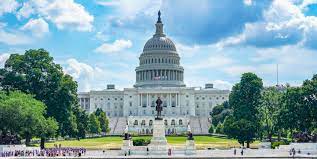Since the 1970s, the United States Federal Government endured 20 shutdowns and number 21 was just narrowly avoided. On Sept. 30, 2023, Congress approved a stopgap deal and narrowly avoided a shutdown. In recent years, ideology and political polarization impacted members of Congress’s ability to cross party lines and make compromises. In an age of growing polarization, both sides prefer shutdowns over compromise.
The length and frequency of shutdowns are increasing and experts believe that the rise of polarization inside Congress may play a role. Congress uses a shutdown as a bargaining chip or a last resort to force the other side to make concessions. But these shutdowns do not hinder the lives of the members of Congress, they hurt the Americans and the people who rely on federally funded programs for support and livelihood. Current events suggest that Congress will not reach a new spending deal.
Shutdown and federal funding gaps were a rarity before Congress passed the Congressional Budget Act of 1974 which created deadlines to pass federal budgets. But it was the gaps in federal funding that were the idea of President Jimmy Carter’s attorney general, Benjamin Civiletti. In the early 1980s, Civiletti argued that the federal government cannot operate where there is a funding gap. Since then, when there is a gap in federal funding, some government agencies have been forced to close their doors and send their employees home without pay.
Today, the agreement reached by both houses of Congress only extends funding until mid-Nov. If an agreement is not reached before that deadline, then non-essential federal agencies and programs are suspended; like health programs–Medicare–, Social Security, SNAP benefits, Food and Drug Administration inspections and small business loans. But the military, Congress and the president still show up for work.
In reality, the most important job Congress has is to pass the budget. But history shows that they can’t even do that.
In 2018, the federal cut services and stopped delivering paychecks for 34 days, the longest shutdown since the Congressional Budget Act was passed. However, the first shutdown occurred only two years after the Act was signed into law. Evidently, the shutdown was weaponized from the start. This act did not motivate Congress to promptly pass budgets, rather it became a political weapon that both sides utilized to reach to get what they wanted–at the expense of federal employees and the American people.
Shutdowns are a confusing and sometimes baffling event for Americans. Dr. Colin Swearingen, a professor of Political Science at John Carroll University, shared his insights on the topic.
Swearingen notes that shutdowns have indeed increased in the past 20 to 25 years and this is, “In part, because of polarization in Congress (Democrats and Republicans get farther apart ideologically) and because some members see using the prospect (and reality) of a shutdown as electorally beneficial.”
A 2022 poll conducted by the Pew Research Center found that within the Senate, the average ideology of both sides has moved away from the middle. On a scale of -0.6 being more liberal, 0 being the middle and 0.6 being more conservative; since 1971–the 92nd Congress–, Democrats have become on average 0.06 more liberal while Republicans have become 0.28 more conservative.
Outside of Congress, Americans are more polarized than ever. Just nine years ago, 92% of Republicans were to the right of the median Democrat and 94% of Democrats were to the left of the median Republican.
Before Trump, Biden and a polarizing pandemic, the divide between the American people was already growing.
The Pew Research Center argues that polarization goes back decades but the Republicans have drifted further away from the middle than the Democrats. However, it’s dishonest to blame one side for shutdowns as it takes an effort from both sides to reach an agreement. One cannot simply blame the other for not coming to the table when they will not do the same.
Swearingen cites only two motivations for a member of Congress to bridge the divide and make a deal. He explains “One is good governance: the [member of Congress] believes that shutting down the government would hurt the economy, families, jobs and the general welfare of the nation.”
“The second is electoral: their constituents demand that the government remain open. Of course, these are the same motivations for being okay with a shutdown,” Swearingen said, “some [members of Congress] believe a shutdown can advance more fiscal sanity, more Ukraine funding accountability and/or more border security.”
He adds, “And they may also feel pressure from constituents (especially those who vote in primary elections) to fight the Biden Administration right here, right now.”
It is evident that the true purpose of a shutdown is blurred. Now, it is a dangerous political weapon during an age of increased polarization.
Currently, ideology is driving the negotiations in Congress, House Speaker Kevin McCarthy stated on Oct. 3, that he would not seek a deal with Democrats. McCarthy’s actions only confirm the extreme polarization in Congress.
This olive branch to the Freedom Caucus was not welcomed with open arms as they ousted him speaker on Oct. 3. McCarthy could not handle the bitter power struggle within the Republicans in the House and the concessions he made allowed them to quickly vote to remove him from his position. The House is in chaos during negotiations to reach a spending agreement. Now without any leadership, a deal before mid-November seems extremely unlikely!
The political divide in Congress is a stark reminder that who your representatives are matters. Vote for individuals that will bridge the divide. Vote for unity and efficiency in government.


